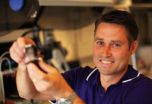(Press-News.org) Men who at the age of 18 years have poorer cardiovascular fitness and/or a lower IQ more often suffer from dementia before the age of 60. This is shown in a recent study encompassing more than one million Swedish men.
In several extensive studies, researchers at the Sahlgrenska Academy of Gothenburg University have previously analyzed Swedish men's conscription results and were able to show a correlation between cardiovascular fitness as a teenager and health problems in later life.
Increased risk for early-onset dementia
In their latest study, based on data from 1.1 million young Swedish men, the Gothenburg researcher team shows that those with poorer cardiovascular fitness and/or lower IQ in their teenage years more often suffer from early-onset dementia.
"Previous studies have shown the correlation between cardiovascular fitness and the risk of dementia in old age. Now, for the first time, we can show that the increased risk also applies to early-onset dementia and its precursors," says Sahlgrenska Academy researcher Jenny Nyberg, who headed the study.
Controlled for other risk factors
Expressed in figures, the study shows that men who when conscripted had poorer cardiovascular fitness were 2.5 times more likely to develop early-onset dementia later in life. A lower IQ entailed a 4 times greater risk, and a combination of both poor cardiovascular fitness and low IQ entailed a 7 times greater risk of early-onset dementia.
The increased risk remained even when controlled for other risk factors, such as heredity, medical history, and social-economic circumstances.
Fitness strengthens the brain
"We already knew that physical and cognitive exercise reduces the risk of neurological disease. Physical exercise increases nerve cell complexity and function and even generation of new nerve cells in the adult brain, which strengthens our mental and physiological functions. In other words, good cardiovascular fitness makes the brain more resistant to damage and disease," says Prof. Georg Kuhn, senior author of the study.
Overlooked group
People who develop early-onset dementia are often of working age and can have children still living at home, which means the consequences for both the sufferers and their families are even more serious. Despite this, patients with early-onset dementia are a relatively overlooked group.
"This makes it important to initiate more research into how physical and mental exercise can affect the prevalence of different types of dementia. Perhaps exercise can be used as both a prophylactic and a treatment for those in the risk zone for early-onset dementia," says Nyberg.
The article Cardiovascular and cognitive fitness at age 18 and risk of early-onset dementia was published online in the scientific journal Brain on 7 March.
INFORMATION:
Link to article: http://brain.oxfordjournals.org/content/early/2014/03/06/brain.awu041.abstract
FACTS ABOUT DEMENTIA AND THE QUOTED STUDY
Dementia is not a disease but a group of different diseases characterized by the gradual worsening of cognitive abilities. Dementia is seen across all ethnic groups and increasingly so with advancing age. Among 65-year-olds, about 2 percent are afflicted, with this figure doubling for every five years of age.
The quoted study encompassed all Swedish men conscripted for mandatory military service between the years 1968 and 2005, a total of 1.1 million individuals. In the study, the researchers have compared the results from the conscripts' cardiovascular fitness and IQ tests with information from national disease registries. During the study period, a total of 660 men were diagnosed with early-onset dementia.
Contact:
Jenny Nyberg
Ph.D. and Researcher at Sahlgrenska Academy
Gothenburg University
jenny.nyberg@neuro.gu.se
Georg Kuhn
Professor and Researcher at Sahlgrenska Academy
Gothenburg University
georg.kuhn@neuro.gu.se
Lower IQ in teen years increase risk of early-onset dementia
2014-03-10
ELSE PRESS RELEASES FROM THIS DATE:
Healthy eating may reduce the risk of preterm delivery
2014-03-10
In the study, which was conducted by researchers from the University of Gothenburg, Sahlgrenska University Hospital and the Norwegian Institute of Public Health, the participants completed a scientifically evaluated questionnaire about what they had been eating and drinking since becoming pregnant.
The researchers also had access to information about the women's general lifestyle e.g. level of education, living conditions, income, weight, physical activity, smoking habits, alcohol consumption, number of children and medical factors such as history of preterm delivery.
15 ...
Computer system simulates the behavior of tax evaders
2014-03-10
Tax fraud is a very serious problem for society, especially in Spain, where tax evasion represents almost one-fourth of its Gross Domestic Product. On the one hand, evasion is a problem because it produces a loss in public resources, something which is especially difficult in a time of economic crisis with cutbacks in public funding; on the other hand, tax fraud damages the effectiveness of justice within the tax system, since not everyone is able to evade taxes equally, thus leading to injustices between small and large companies and between the self-employed and employees. ...
New sugar-test to reduce false-positive cancer diagnoses
2014-03-10
The world's most widespread test for ovarian cancer reports false-positives in 94 of 100 diagnosed cases. Now, chemists at the University of Copenhagen working with clinical researchers at University College London have developed a method able to halve the number of false-positives. When fully developed, the new test will spare a significant number of women from unnecessary worry and further testing. Furthermore, global health care providers stand to save substantial sums – just by including a test on a certain sugar molecule in tandem with the currently prevailing diagnostic ...
There is no beating the breathalyzer this St. Patrick's Day (video)
2014-03-10
WASHINGTON, March 10, 2014 — If you're having some drinks this St. Patrick's Day weekend, remember to have a designated driver, otherwise you may end up on the business end of a breathalyzer on the side of the road. If you think you can beat it, think again; chemistry will land you in cuffs. In the American Chemical Society's (ACS') latest Reactions video, we examine how your breath can get you busted when you've had too much to drink. The video is available here: http://youtu.be/rvVzlg26bCM
Subscribe to the series at Reactions YouTube, and follow us on Twitter @ACSreactions ...
Europe must improve its response to the threat of plant pests and diseases
2014-03-10
Potentially devastating plant pests and diseases are highlighted in a new report from EASAC, the European Academies' Science Advisory Council, the leading provider of independent scientific advice to Europe's policy-makers. In the detailed EU-wide study of emerging plant pests and diseases, EASAC describes their combined threat to crops and forests and wider ecosystems, with implications for human health. In economic terms, as admitted by the EU Commission, billions of euros could be at stake and the environmental impact may be irreversible. Prof. Anne Glover, Chief Scientific ...
Young skin cancer survivors at risk of other cancers later
2014-03-10
Australian author on the paper, Professor Rodney Sinclair, Professor of Medicine at the University of Melbourne and Director of Dermatology at Epworth HealthCare said that the risk decreased significantly with increasing age, but it remains higher compared with individuals who have never had NMSC.
"The risk for developing any cancer subsequent to NMSC decreases significantly with increasing age: 23 times higher risk for those under 25 years of age; 3.52 for those 25-44 years of age; 1.74 for those 45- 59 years of age; and 1.32 for those older than 60 years.
Published ...
Rice synthetic biologists shine light on genetic circuit analysis
2014-03-10
In a significant advance for the growing field of synthetic biology, Rice University bioengineers have created a toolkit of genes and hardware that uses colored lights and engineered bacteria to bring both mathematical predictability and cut-and-paste simplicity to the world of genetic circuit design.
"Life is controlled by DNA-based circuits, and these are similar to the circuits found in electronic devices like smartphones and computers," said Rice bioengineer Jeffrey Tabor, the lead researcher on the project. "A major difference is that electrical engineers measure ...
New high-tech glasses detect cancer cells during surgery
2014-03-10
A team of scientists at Washington University School of Medicine in St. Louis (WUSTL) and the University of Arizona (UA) in Tucson led by Samuel Achilefu have created a pair of high-tech glasses that help surgeons visualize cancer cells during surgeries, which glow blue when viewed through the glasses.
Achilefu published the 2013 article he coauthored as part of a special section in the SPIE Journal of Biomedical Optics on fluorescence molecular imaging that details the development of the high-tech glasses (available via open access in the SPIE Digital Library).
Achilefu, ...
Where nothing grows anymore
2014-03-10
Jena (Germany) Vast fields of sunflowers, sprawling pine trees and slim cypresses, as well as vineyards as far as the eye can see – these are typical memories of Tuscany for all those who have been there. By contrast, Professor Dr. Beate Michalzik from the Friedrich Schiller University of Jena and her colleagues are interested in the more barren aspects of the region in Central Italy: In a study the Jena geographers analyzed the condition of the soil in the region known as 'Crete Senesi' between Florence and Grosseto, whose hills are typically characterized by erosion – ...
Employers 'routinely discriminating against stammerers'
2014-03-10
Employers are routinely discriminating against people who stammer, rejecting them because of concerns about possible negative reactions from customers or team members, new research suggests.
A study by Dr Clare Butler, of Newcastle University Business School, published in the journal Work, Employment and Society says that people who stammer experience widespread prejudice in the jobs market.
Thirty-six men from England and Wales, ranging in age from 21 to 65 years, were interviewed and all reported routine discrimination. Some had been immediately rejected at interviews ...




